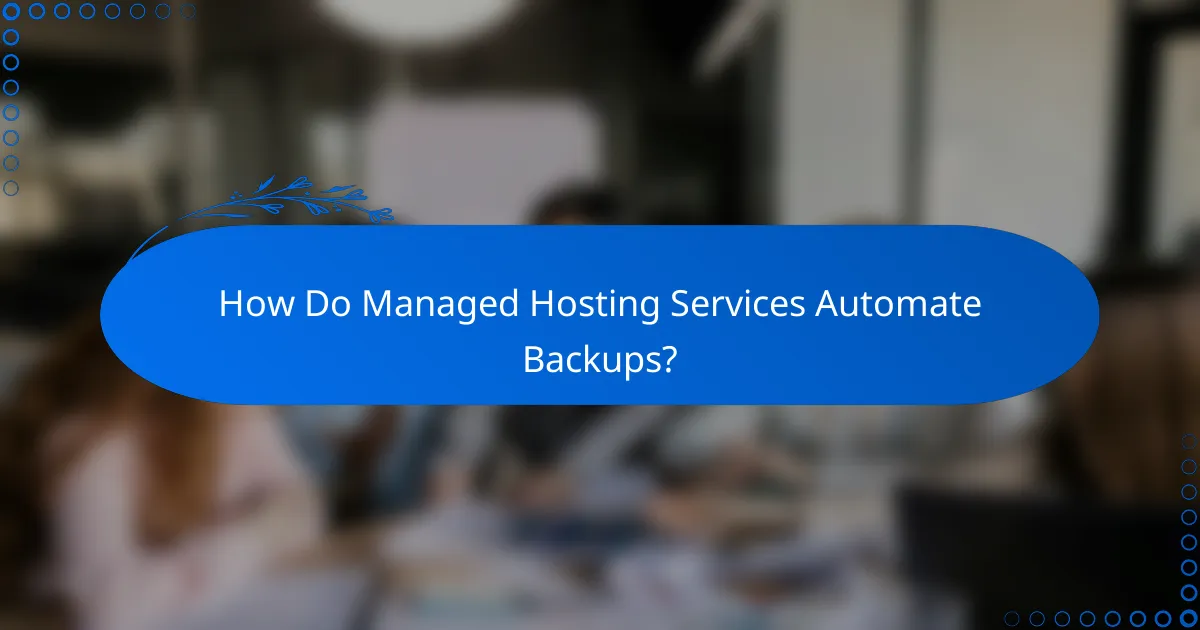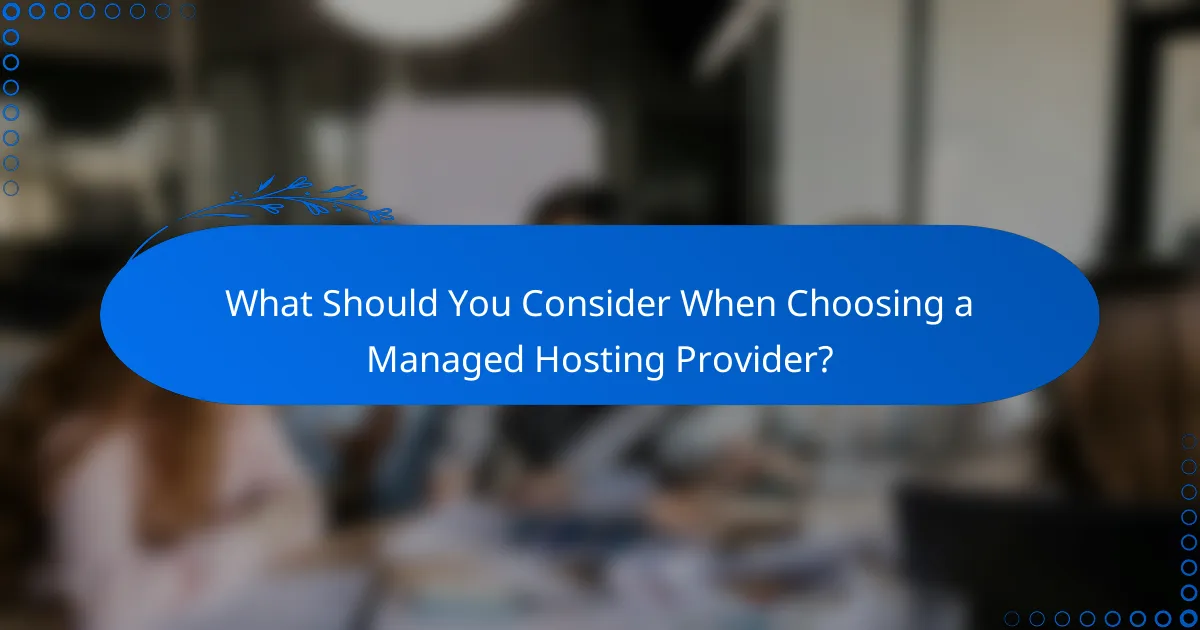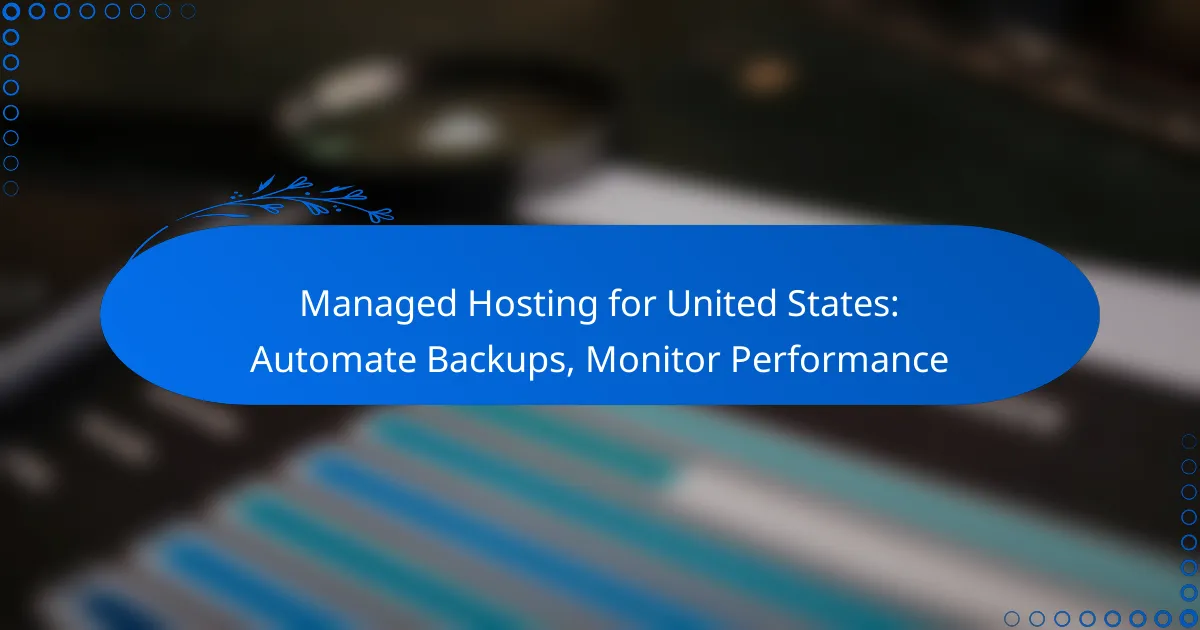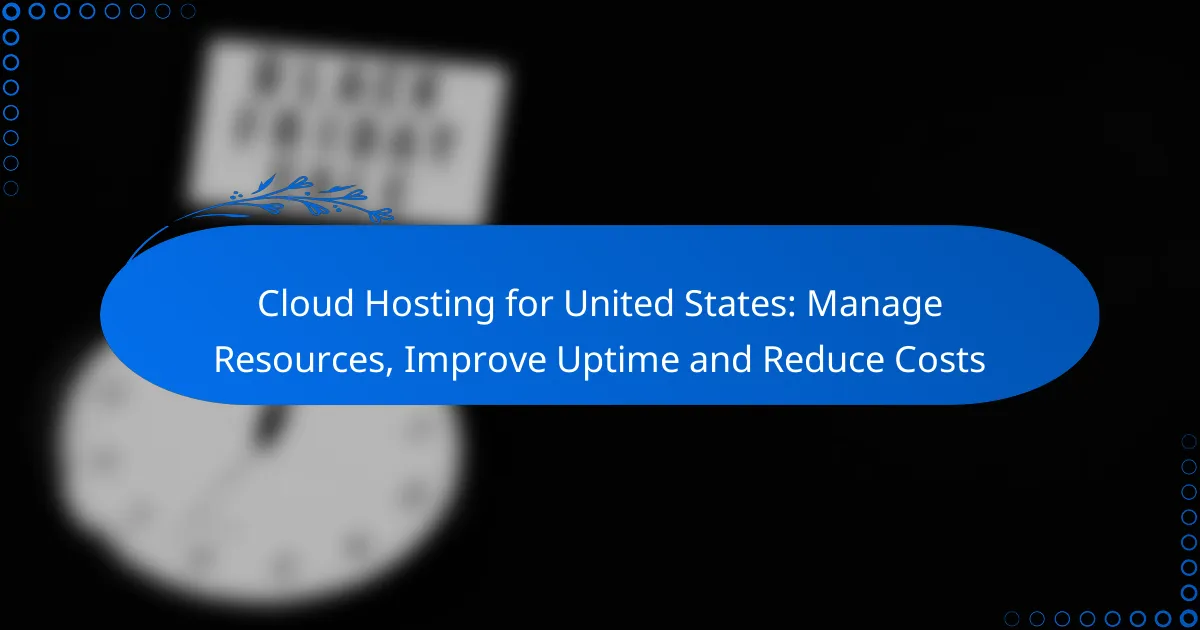Managed hosting in the United States offers businesses a reliable solution to automate backups and monitor performance, ensuring data safety and operational efficiency. With services like AWS, companies can significantly reduce downtime and enhance user experience through real-time performance tracking. Automated backups protect against data loss, while expert support provides crucial assistance for optimal website functionality. This approach allows organizations to focus on growth and innovation without the burden of technical management.

What Are the Best Managed Hosting Solutions in the United States?
Amazon Web Services (AWS) is a premier managed hosting solution celebrated for its scalability and flexibility, catering to over a million active customers globally. It provides a wide array of services, including computing power, storage options, and databases, making it ideal for businesses of all sizes, from startups to large enterprises.
With AWS, users can automate backups through AWS Backup, ensuring data is securely stored and easily recoverable, with incremental backup options that can cut storage costs by up to 60%. The platform also features performance monitoring tools like Amazon CloudWatch, which tracks resource utilization and application performance in real-time, empowering businesses to make informed decisions.
By leveraging AWS, businesses can boost operational efficiency, reduce downtime by up to 99.99%, and scale resources based on demand, enhancing customer satisfaction and retention while paving the way for innovative solutions.
Amazon Web Services (AWS)
Google Cloud Platform (GCP) stands out as a leading managed hosting solution, excelling in data analytics and machine learning, and powering over 5 million applications worldwide. Its robust infrastructure supports diverse applications, making it a favored choice for tech-savvy companies eager to harness big data and AI.
GCP offers automated backup solutions via Google Cloud Storage, allowing users to effortlessly schedule backups, with versioning options that can retain up to 30 previous file versions. Additionally, Google Stackdriver provides performance monitoring, offering insights into applications and infrastructure that can lead to performance improvements of up to 50%.
Utilizing GCP enables businesses to leverage advanced technologies, optimize operations, and ensure high availability, ultimately driving innovation and growth while setting the stage for a simpler yet effective option.
Google Cloud Platform
DigitalOcean is a user-friendly managed hosting provider that prioritizes simplicity and cost-effectiveness, serving over 1.5 million developers. It is particularly popular among startups and small businesses for its transparent pricing, starting at just $5 per month, and intuitive interface.
DigitalOcean includes automated backups in its Droplet service, ensuring regular data saves without manual effort, with retention policies that can keep backups for up to 14 days. The platform also features monitoring tools like DigitalOcean Monitoring, which tracks resource performance and alerts users to potential issues, enhancing operational transparency.
By choosing DigitalOcean, businesses can streamline operations, cut costs, and quickly deploy applications, fostering a more agile development environment that leads to the next reliable hosting solution.
DigitalOcean
SiteGround is renowned for its outstanding customer support and dependable managed hosting services, catering to over 2 million domains worldwide. It primarily serves small to medium-sized businesses, striking a balance between performance and affordability, with plans starting at $3.99 per month.
SiteGround automates daily backups and offers a one-click restore feature, ensuring users can recover their websites effortlessly, backed by a 99.99% uptime guarantee. Its performance monitoring tools help maintain optimal website speed, achieving average load times of under 600 milliseconds, which is crucial for user engagement.
With SiteGround, businesses can concentrate on growth while enjoying peace of mind regarding their website’s security and performance, ultimately enhancing their online presence and becoming a favored choice for WordPress users.
SiteGround
Bluehost is a well-regarded managed hosting solution, particularly recommended for WordPress users, hosting over 2 million websites globally. It combines user-friendliness with powerful features, making it ideal for those new to website management, with plans starting at $2.95 per month.
Bluehost offers automated backups through its managed WordPress hosting plans, ensuring consistent data protection, with options for restoring backups in just minutes. The platform also includes performance monitoring tools to help users track site speed and reliability, achieving an impressive average uptime of 99.98%.
By choosing Bluehost, businesses can simplify their hosting experience, benefit from robust support, and ensure their websites run smoothly, which is essential for maintaining user engagement and satisfaction, seamlessly transitioning to the next level of hosting solutions.

How Do Managed Hosting Services Automate Backups?
Managed hosting services automate backups to ensure data safety and reliability, significantly reducing the risk of loss from unforeseen events like hardware failures or cyberattacks. A 2023 survey revealed that 60% of businesses experiencing data loss cited hardware failure as a primary cause, highlighting the need for robust backup systems. Automation allows organizations to focus on core operations without the burden of data management, enhancing overall productivity. By implementing scheduled and incremental backups, these services not only strengthen data protection but also optimize storage resources, ensuring efficient use of available space.
Scheduled Backups
Scheduled backups occur at predefined intervals—daily, weekly, or monthly—tailored to the organization’s specific needs and data volatility. For instance, a retail business might choose nightly backups to capture daily sales data, ensuring that the most recent information is readily available for recovery. This frequency can significantly reduce the risk of data loss; studies show that businesses with regular backup schedules are 70% less likely to suffer catastrophic data loss. Furthermore, scheduled backups simplify compliance with data protection regulations, demonstrating a proactive commitment to safeguarding sensitive information and paving the way for advanced strategies like incremental backups.
Incremental Backups
Incremental backups save only the changes made since the last backup, making them both efficient and quick. This method can cut backup time by up to 90% compared to full backups, which is crucial for businesses with large data volumes. For example, if a full backup occurs on Sunday, only the changes from Monday to Saturday would be captured in the incremental backups, allowing for faster recovery times as only the most recent changes need to be restored. This approach is particularly beneficial for enterprises with extensive databases, ensuring that backup processes do not disrupt daily operations while still providing robust data protection and facilitating smoother transitions to cloud storage solutions.
Cloud Storage Solutions
Cloud storage solutions offer scalable and flexible options for storing backup data, with managed hosting services increasingly leveraging cloud technology to enhance backup processes and accessibility. For example, data can be backed up to a cloud server, enabling easy access from anywhere with an internet connection, which is especially beneficial for remote teams or businesses operating across multiple locations. Additionally, cloud storage typically provides redundancy, with data replicated across multiple servers, enhancing security and availability. This redundancy is critical, as studies indicate that businesses utilizing cloud solutions experience a 50% reduction in data loss incidents, making it a vital consideration for organizations looking to strengthen their backup strategies.

What Performance Monitoring Tools Are Available?
Performance monitoring tools are vital for ensuring optimal website functionality and enhancing user experience. They pinpoint bottlenecks and track system health in real-time, which is essential for maintaining a competitive edge. By leveraging these tools, businesses can proactively resolve issues before they affect users, potentially cutting downtime by up to 50% and boosting page load speeds by 30% or more.
New Relic
These tools deliver insights into various metrics, such as server response times, uptime, and resource usage. For example, a server response time over 200 milliseconds can trigger a 4.3% increase in bounce rates. This data is crucial for sustaining high performance and reliability, enabling companies to choose tools tailored to their specific needs and infrastructure, whether they are small startups or large enterprises.
Datadog
Regular monitoring enhances performance and minimizes downtime, ultimately elevating customer satisfaction. Understanding the available tools empowers businesses to make informed decisions about their hosting solutions, ensuring adaptability to evolving demands and technological advancements.
Pingdom
New Relic is a comprehensive performance monitoring tool that offers real-time insights into application performance. It features application monitoring, infrastructure monitoring, and user experience tracking, allowing businesses to accurately identify performance issues across their entire stack. Organizations using New Relic report a 20% boost in application performance after implementing its monitoring solutions.

What Are the Benefits of Managed Hosting?
Managed hosting offers numerous advantages, making it a preferred choice for businesses in the United States. It enables companies to concentrate on their core operations while experts manage the technical aspects of hosting. This service can enhance performance by up to 30% and provides peace of mind regarding security and maintenance—essential in today’s digital landscape, where cyber threats are escalating.
One primary benefit is automated backups, ensuring consistent data protection without manual effort. Industry statistics reveal that 60% of small businesses experiencing data loss shut down within six months, underscoring the importance of reliable backup solutions. Additionally, managed hosting services often include performance monitoring, which identifies and resolves issues before they affect users, maintaining a seamless experience.
Moreover, managed hosting can lead to significant cost savings over time. By outsourcing hosting management, businesses can reduce in-house IT staff and infrastructure investments by up to 40%. This allows for better resource allocation toward growth and innovation, enabling companies to invest in new technologies and market expansion.
Security is paramount for any online business, and managed hosting provides enhanced protection against various threats. With dedicated security measures like firewalls and intrusion detection systems, businesses can safeguard sensitive data more effectively. Regular security updates and patches are also included, ensuring systems remain up-to-date and compliant with industry standards.
For instance, managed hosting providers often conduct routine vulnerability assessments to identify potential risks. Studies show that proactive security measures can reduce breach incidents by up to 70%. They implement best practices for data encryption and secure access controls, significantly lowering the likelihood of breaches. This proactive approach not only protects the business but also builds customer trust, fostering long-term relationships.
The implications of improved security are profound. Businesses can operate confidently, knowing their data is secure. This assurance can lead to increased customer loyalty and potentially higher conversion rates, as studies indicate that 80% of consumers prioritize security when selecting a service provider.
Scalability is another significant advantage of managed hosting. As businesses grow, their hosting needs can change rapidly. Managed hosting solutions are designed to adapt to these evolving requirements, allowing easy upgrades and resource allocation. This flexibility ensures businesses can handle increased traffic without compromising performance, especially during critical sales periods.
For example, during peak seasons, managed hosting providers can quickly scale resources to accommodate higher visitor volumes, with some services offering auto-scaling features that adjust resources in real-time. This can include adding bandwidth, storage, or processing power. The ability to scale seamlessly allows businesses to focus on growth without worrying about technical limitations, ensuring smoother operations during high-demand periods.
The implications of scalability are critical for long-term success. Companies can launch new products or services without fearing server overload. This agility provides a competitive edge in fast-paced markets, enabling businesses to respond swiftly to opportunities and challenges, ultimately driving innovation and customer satisfaction.
Managed hosting services typically include access to expert support, invaluable for businesses lacking in-house technical expertise. This support is available around the clock, ensuring prompt issue resolution, with many providers boasting response times under 30 minutes for critical problems. With a dedicated team monitoring systems, businesses can minimize downtime and maintain optimal performance, essential for a positive user experience.
For instance, if a website experiences an unexpected outage, managed hosting support teams can quickly diagnose and resolve the issue, often restoring service within minutes. This rapid response significantly reduces the impact on business operations. Additionally, these experts provide valuable insights and recommendations for optimizing performance and security, helping businesses stay ahead of the competition.
The implications of having expert support are substantial. Businesses can leverage this expertise to enhance their online presence and improve user experience, with studies showing that companies with strong technical support see a 20% increase in customer satisfaction. This not only leads to better operational efficiency but also allows companies to focus on strategic initiatives rather than day-to-day technical challenges, paving the way for future growth.

What Should You Consider When Choosing a Managed Hosting Provider?
Choosing a managed hosting provider requires careful evaluation of several key factors that can greatly influence your website’s performance and security. For example, reliable platforms can deliver up to 99.9% uptime, essential for sustaining user engagement and trust.
Customer support is a crucial consideration. Effective support ensures quick resolution of technical issues, minimizing downtime; studies indicate that businesses with 24/7 support experience 30% less downtime than those with limited hours. This responsiveness can be transformative during peak business hours.
Scalability of hosting services is another vital aspect. As your business expands, so do your hosting needs, making flexibility essential; a provider that allows you to adjust resources within minutes can handle traffic spikes without sacrificing performance.
Security features are paramount. A reputable provider should offer strong security measures, including DDoS protection and regular backups, to safeguard your data against breaches and cyber threats. With 43% of cyber attacks targeting small businesses, robust security protocols are non-negotiable for any hosting solution.
Pricing models for managed hosting can vary significantly, affecting your overall budget. Common options include monthly subscriptions, ranging from $20 to $500, pay-as-you-go plans, and tiered pricing based on resource usage. Understanding these models helps align your hosting choice with your financial strategy.
For instance, a monthly subscription typically offers a fixed rate for a set amount of resources, providing predictable expenses, while pay-as-you-go allows you to pay only for what you use, which is advantageous for businesses with fluctuating traffic. This flexibility can lead to savings during off-peak periods.
It’s crucial to factor in any additional costs, such as setup fees ranging from $50 to $200, or charges for exceeding resource limits. Grasping the total cost of ownership, including potential hidden fees, will enable you to make an informed decision and avoid budget overruns.



